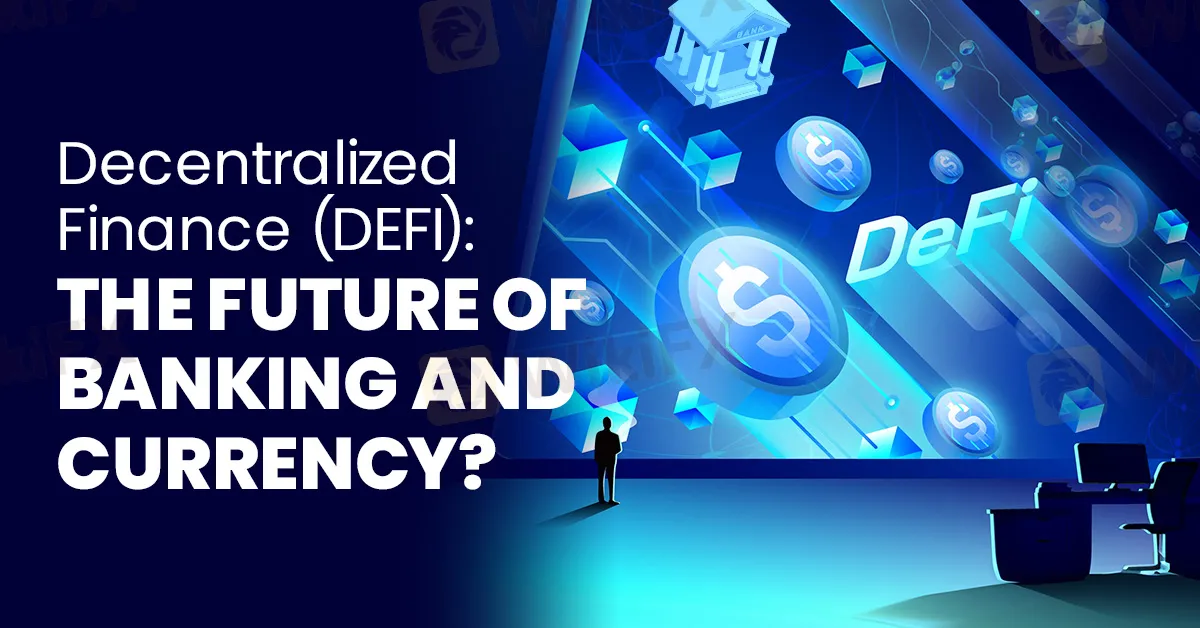简体中文
繁體中文
English
Pусский
日本語
ภาษาไทย
Tiếng Việt
Bahasa Indonesia
Español
हिन्दी
Filippiiniläinen
Français
Deutsch
Português
Türkçe
한국어
العربية
Decentralized Finance (DeFi): The Future of Banking?
Abstract:In the ever-evolving landscape of finance, the rise of Decentralized Finance (DeFi) has ignited discussions on its potential to reshape traditional banking models, offering a glimpse into a future marked by inclusivity, accessibility, and transformative financial services.

In the dynamic realm of finance, the emergence of Decentralized Finance (DeFi) has sparked discussions about the potential transformation of traditional banking paradigms. DeFi, anchored in blockchain technology, promises to revolutionize how financial transactions are conducted, services are accessed, and interactions with the global economy unfold. Upon delving into the intricacies of DeFi, it becomes apparent that this burgeoning ecosystem holds the potential to reshape the future of banking.
DeFi, short for Decentralized Finance, denotes a blockchain-based financial system that operates independently of traditional intermediaries such as banks. Instead, it leverages smart contracts on blockchain platforms like Ethereum to facilitate diverse financial services, including lending, borrowing, and trading. At its core, DeFi is grounded in principles of transparency, accessibility, and inclusivity, aiming to democratize financial services globally.

Critical to the foundation of Decentralized Finance (DeFi) are its key components, each playing a pivotal role in reshaping the financial landscape. Firstly, smart contracts, self-executing agreements with terms directly encoded in their scripts, emerge as powerful tools. These contracts automate and enforce agreements autonomously, mitigating the need for intermediaries and thereby reducing the risk of fraud while simultaneously enhancing operational efficiency. Secondly, Decentralized Exchanges (DEXs) empower users by facilitating direct trading of digital assets without reliance on centralized authorities. This not only eliminates the need for intermediaries but also fosters a more transparent and censorship-resistant trading environment. Thirdly, DeFi platforms introduce lending and borrowing protocols, establishing decentralized lending markets that operate independently. This innovative approach opens avenues for individuals who might be excluded from traditional banking systems, promoting financial inclusion. Lastly, the incorporation of Stablecoins, tethered to real-world assets or fiat currencies, ensures a stable store of value within the volatile cryptocurrency market. This stability facilitates more predictable financial transactions, further enhancing the reliability and utility of the DeFi ecosystem. Together, these critical components lay the groundwork for a transformative shift in the way financial services are accessed and utilized.
The potential of Decentralized Finance (DeFi) is marked by several transformative factors. Firstly, DeFi holds the promise of fostering financial inclusion by extending services to unbanked and underbanked populations, overcoming geographical and economic barriers. Secondly, DeFi aims to reduce dependency on intermediaries, thereby lowering transaction costs, enhancing operational efficiency, and mitigating the risks associated with censorship or manipulation. Thirdly, operating on a decentralized and borderless network, DeFi offers global accessibility, enabling users worldwide to access financial services without reliance on traditional banking infrastructure. However, these promises come with their share of challenges and risks. Regulatory uncertainty poses a significant hurdle for DeFi as global authorities grapple with overseeing and integrating these decentralized systems into existing legal frameworks. Additionally, concerns about the security of DeFi platforms have surfaced, driven by smart contract vulnerabilities and hacking incidents. Addressing these challenges becomes crucial as the industry matures, ensuring a sustainable and secure future for the evolving landscape of decentralized finance.
In conclusion, Decentralized Finance is undeniably causing ripples in the financial industry, challenging conventional banking models, and providing a glimpse into a more inclusive and accessible financial future. While DeFi's potential is vast, its successful integration into the mainstream hinges on addressing regulatory uncertainties, fortifying security measures, and gaining broader acceptance. As the journey towards the future of banking unfolds, the role of decentralized finance in shaping this evolution demands attention and exploration.

Disclaimer:
The views in this article only represent the author's personal views, and do not constitute investment advice on this platform. This platform does not guarantee the accuracy, completeness and timeliness of the information in the article, and will not be liable for any loss caused by the use of or reliance on the information in the article.
Read more

Gigamax Scam: Tracking Key Suspects in RM7 Million Crypto Fraud
Malaysian authorities are actively pursuing seven individuals linked to the Gigamax investment scam, which has defrauded investors of over RM7 million. The suspects include an Indonesian national, identified as Awaludin, who is believed to be the mastermind behind the scheme, and six Malaysians who served as promoters and speakers for the fraudulent operation.

Singaporean Arrested in Thailand for 22.4 Million Baht Crypto Scam
Thai authorities have apprehended a 32-year-old Singaporean man suspected of being part of a transnational syndicate involved in cryptocurrency scams. The group is accused of defrauding victims of more than 22.4 million baht (S$886,000) through a fraudulent trading platform.

Kraken and BitGo to Handle FTX Payouts Starting January 2025
Kraken and BitGo will oversee the first FTX payouts starting January 3, 2025. 98% of creditors receive at least 118% of their claims in cash.

FCA Seeks Input to Shape UK Crypto Market Regulations
UK FCA seeks public feedback on crypto rules to improve market transparency, protect consumers, and support growth. Comments are open until March 2025.
WikiFX Broker
Latest News
Geopolitical Events: What They Are & Their Impact?
Volkswagen agrees deal to avoid Germany plant closures
Top 10 Trading Indicators Every Forex Trader Should Know
TradingView Launches Liquidity Analysis Tool DEX Screener
MultiBank Group Wins Big at Traders Fair Hong Kong 2024
WikiEXPO Global Expert Interview: Simone Martin—— Exploring Financial Regulation Change
'Young investors make investment decisions impulsively to keep up with current trends' FCA Reveals
Why Do You Feel Scared During Trade Execution?
CySEC Settles Compliance Case with Fxview Operator Charlgate Ltd
Malaysian Influencer Detained in Taiwan Over Alleged Role in Fraud Scheme
Currency Calculator


